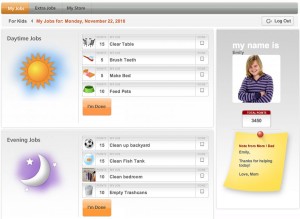 Do you like to make New Year’s resolutions? Maybe your kids would like it too!
Do you like to make New Year’s resolutions? Maybe your kids would like it too!
Many people enjoy making lists and committing to positive changes as the new year approaches. It’s a good time to help children learn about setting goals, creating plans, and making a commitment towards important accomplishments.
The best way to teach children about the importance of New Year’s resolutions is to make it a family activity. When you sit down together and reflect on the past year, it helps children understand about resolutions, or goals. Children can share in the discussion by talking about things they enjoyed during the past year – including participation on a soccer team, learning to play the piano, reading a particular book, or taking a trip. Things that are fun are part of the process. But things that make us proud also help create new resolutions for the coming year.
Different aged children will have different ideas about what they want in the coming year. Making age-appropriate resolutions is important. Some ideas for resolutions for younger kids are listed below (but only you can decide what’s important to you and your family!):
 Keep my room organized.
Keep my room organized.- Make my bed daily.
- Drink more water each day.
- Eat at least 5 fruits each day.
- Learn to play soccer.
- Learn to ride a bike.
- Read at least one chapter book each week.
- Get up 15 minutes earlier each morning to have more time.
- Say “please” and “thank you” when appropriate.
- Help with the dinner dishes each night.
- Spend more time outdoors and less time on the computer/phone/technology.
- Write a letter to someone once a month and mail it.
Older kids will have higher goals like volunteering at an animal shelter, exercising, developing new friendships, and goals related to taking higher levels of responsibility.
Rewards That Last
Rewards for achieving goals should be meaningful and long-lasting for them to have the most positive impact on the outcomes. Goals that offer rewards such as weight loss, improved skill in a sport, better health, improved organization, learning more about a topic of interest through reading, and being able to ride a bike are all great rewards.
But some of the greatest and most long-lasting rewards come from parents who offer encouragement, recognition, praise, and a focus on how well a child is progressing. These types of words and actions increase the child’s self-esteem and help him or her stay focused on the goal.
Be Flexible
We know that keeping New Year’s resolutions is not easy – so don’t expect a child to do it 100% of the time! When a child makes an effort toward self-improvement, it is a success. Even if the resolution or goal is not completely accomplished, that’s okay. Stay flexible.
There is no cause for punishment or becoming frustrated with your child (remember that resolution you made to swear off sweets and go to the gym every day last year – yikes!).
Simply taking time to sit down with your child at the end of the year and helping him or her see how much he has learned is helpful. Allowing her to spend some time thinking about what she wants to do in the coming year is a great way to her understand the importance of planning and organization.
The best part of all is to do it as a family and laugh at your mistakes, while creating a better future.
Google ‘free reward and behavior charts’ to find lots of free reward charts and downloadable certificates for kids. You can use the chore charts to create a list of the resolutions and keep track of your child’s progress. It’s a good way to keep your child motivated.
Happy New Year!

 Birthdays
Birthdays